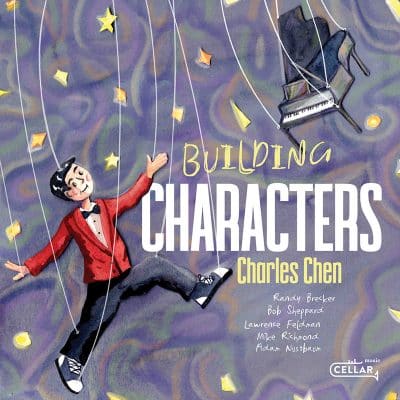Charles Chen Building Characters
 Charles Chen
Charles Chen
Building Characters
Cellar Music Group
The concept of building character portraits is something usually found in roots music, not jazz. Pianist Charles Chen. Yet, look a bit deeper and you will find character building in jazz too, most famously by Duke Ellington and Charles Mingus. In Building Characters, Chen takes this musical tradition a step further by evoking a musician and a fictional character on every track, highlighting the sonic fingerprints of the musician and conveying the essence of the fictional character. Chen has ample support in his endeavor from trumpeter Randy Brecker, Bob Sheppard and Lawrence Feldman (tenor saxophones), Mike Richmond (bass), and Adam Nussbaum (drums).
Opener “Kismet” is an ode to the alias of a collaborator and friend whom Chen met online on a Jazz Piano server of Discord. Chen and ‘Kismet’ quickly bonded over similar humor and a shared love for “heartbreakingly gorgeous ballads.” The track “Kismet” begins as a slow, pop-like ballad where only the piano and bass are prominent. While there is a background of orchestrated horns, the only soloist on the track is the piano, with drummer Nussbaum steering it nicely. T Chen makes references to Keith Jarrett and Brad Mehldau in the liners, but to these ears, the piano melody is fairly elementary and not of that ilk.
Chen designed the release for May, during Asian-American Heritage Month. Perhaps the most apropos tune in that regard is “Zhang Fei, Fierce Warrior,” a character taken from the Romance of the Three Kingdoms. This character is loyal and formidable, with a terrible temper. Hence, the intensity of the track, a modal piece influenced by John Coltrane’s Classic Quartet, with pieces relating to every member except Jimmy Garrison, is his notes, though Richmond comes through with a robust bass solo.
“If on a winter’s night a traveler” is inspired by the postmodern novel of the same title by Italo Calvino. The book, revolutionary in concept, features the reader themselves in the book. To encapsulate these larger-than-life ideas and postmodern leanings, Chen drew inspiration from the sounds of Wayne Shorter and Herbie Hancock, particularly circa the Speak No Evil record. To further differentiate the lack of traditional direction of Calvino’s work, Chen plays with form on this track, making the end of the piece transport back to the middle. Brecker is typically fierce in his solo, as are the two tenorists, while Nussbaum keeps pushing the groove, partly on brushes.
“Colossus of Rhodes” not surprisingly has Chen on Fender Rhodes, paying tribute in his own way to Herbie Hancock, Pat Metheny and the Brecker Brothers. Notable on this track is that bassist Mike Richmond plays acoustic bass, yet due to his strong and melodious tone still blends poignantly with the electric Fender Rhodes sound. All three horns are robust and e tune finds a uneven balance between fusion and swing, with the latter winning out.
“Alice in Wonderland’ is one of two covers. Chen leans on the stylings of Bill Evans and Chick Corea (acoustic) with the impressive bass playing nodding directly to Scott LaFaro. “Straw Hat” is inspired by the anime character Straw Hat Luffy, with the musical hero being Horace Silver. Silver’s boogaloo style is meant to reflect the character’s sense of adventure and daring. “Soph, Aeon of Wisdom” derives its name from the deity in Gnostic cosmology. It’s a glowing feature for Randy Brecker on flugelhorn, using rising triads akin to a church choir. Sheppard and Feldman blow a series of fierce clusters, set to Chen’s dynamic comping for perhaps the album’s most engaging melody. On the surface, the standard “Stardust” seems to be an odd choice as it does not directly represent a character per se. Chen selected the piece to mesh together three different piano approaches -leaning into the lightness of Red Garland, Ahmad Jamal’s use of dynamics and range, and Gene Harris’s power and energy, making for Chen’s strongest pianism of any track. The beginning and ending of the piece both mark the uniqueness of Chen’s arrangement: the track opens potently and is followed by Bob Sheppard’s tenor over a series of piano arpeggiations. The ending surprisingly reflects Chen’s love for classical music in what is otherwise a bluesy rendering.
Building Characters adheres closely to jazz tradition, especially the sounds of the late ‘50s through the mid-60s. It’s a boon for lovers of straight-ahead jazz, performed by a group of exceptionally strong and experience players. The music just seems to flow effortlessly, yet there are indelible melodies and passionate solos throughout.
– Jim Hynes
Buy Us a Cup of Coffee!
Join the movement in supporting Making a Scene, the premier independent resource for both emerging musicians and the dedicated fans who champion them.
We showcase this vibrant community that celebrates the raw talent and creative spirit driving the music industry forward. From insightful articles and in-depth interviews to exclusive content and insider tips, Making a Scene empowers artists to thrive and fans to discover their next favorite sound.
Together, let’s amplify the voices of independent musicians and forge unforgettable connections through the power of music
Make a one-time donation
Make a monthly donation
Make a yearly donation
Buy us a cup of Coffee!
Or enter a custom amount
Your contribution is appreciated.
Your contribution is appreciated.
Your contribution is appreciated.
DonateDonate monthlyDonate yearlyYou can donate directly through Paypal!
Subscribe to Our Newsletter
Order the New Book From Making a Scene
Breaking Chains – Navigating the Decentralized Music Industry
Breaking Chains is a groundbreaking guide for independent musicians ready to take control of their careers in the rapidly evolving world of decentralized music. From blockchain-powered royalties to NFTs, DAOs, and smart contracts, this book breaks down complex Web3 concepts into practical strategies that help artists earn more, connect directly with fans, and retain creative freedom. With real-world examples, platform recommendations, and step-by-step guidance, it empowers musicians to bypass traditional gatekeepers and build sustainable careers on their own terms.
More than just a tech manual, Breaking Chains explores the bigger picture—how decentralization can rebuild the music industry’s middle class, strengthen local economies, and transform fans into stakeholders in an artist’s journey. Whether you’re an emerging musician, a veteran indie artist, or a curious fan of the next music revolution, this book is your roadmap to the future of fair, transparent, and community-driven music.
Get your Limited Edition Signed and Numbered (Only 50 copies Available) Free Shipping Included
Discover more from Making A Scene!
Subscribe to get the latest posts sent to your email.









